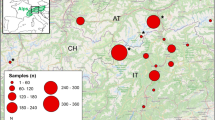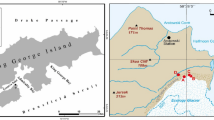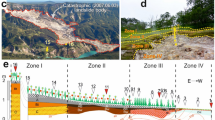Abstract
WHILE conducting pedological and biological studies in the ice-free areas of East Antarctica, one of us (F. C. U.) and Dr. H. Janetschek had the opportunity in February 1962 to climb Mount Erebus. Considered the only active volcano known in Antarctica, Mount Erebus (3,721 m) consists of trachyte, kenyte, basalt and other volcanic rocks1. Extensive ice and snow cover limits the soil occurrence to the lower snow-free slopes, to exposed rock projections, a few areas near the hot fumaroles, and in the vicinity of the active crater.
This is a preview of subscription content, access via your institution
Access options
Subscribe to this journal
Receive 51 print issues and online access
$199.00 per year
only $3.90 per issue
Buy this article
- Purchase on Springer Link
- Instant access to full article PDF
Prices may be subject to local taxes which are calculated during checkout
Similar content being viewed by others
References
David, W. T., and Priestley, R. E., Volcanism, British Antarctic Expedition, 1907–1909. Reports of Scientific Investigations, 1, 208 (1914).
Ugolini, F. C., J. Geol. Geophys. (in the press).
Author information
Authors and Affiliations
Rights and permissions
About this article
Cite this article
UGOLINI, F., STARKEY, R. Soils and Micro-organisms from Mount Erebus, Antarctica. Nature 211, 440–441 (1966). https://doi.org/10.1038/211440a0
Issue Date:
DOI: https://doi.org/10.1038/211440a0
This article is cited by
-
Evidence of global-scale aeolian dispersal and endemism in isolated geothermal microbial communities of Antarctica
Nature Communications (2014)
-
Distribution of psychrophilic microorganisms in soils of Terra Nova Bay and Edmonson Point, Victoria Land and their biosynthetic capabilities
Polar Biology (2009)
-
A 3,000-year record of penguin populations
Nature (2000)
-
Biodiversity of yeasts and filamentous microfungi in terrestrial Antarctic ecosystems
Biodiversity and Conservation (1996)
-
The biota and environment of fumaroles on Mt Melbourne, northern Victoria Land
Polar Biology (1987)
Comments
By submitting a comment you agree to abide by our Terms and Community Guidelines. If you find something abusive or that does not comply with our terms or guidelines please flag it as inappropriate.



